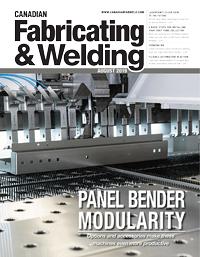Associate Editor
- FMA
- The Fabricator
- FABTECH
- Canadian Metalworking
Cobalt Industries’ owner thinks big
Clint Taylor grows his fab shop with new equipment and expanded floor space
- By Lindsay Luminoso
- August 8, 2019
- Article
- Fabricating

Depending on the time of year and the volume of jobs that come in, the shop can adapt its workflow to avoid major backups. But for the most part, work remains steady. Photo courtesy of Cobalt.
Portage la Prairie is a small city located in the Central Plains Region of Manitoba. With just a little over 13,000 people, this community is considered a transportation hub because of its strategic proximity to the Assiniboine River, the intersection of the Canadian Pacific and Canadian National Railways, and the Trans-Canada Highway, making it an ideal spot for Cobalt Industries to expand and grow.
Clint Taylor, owner of Cobalt Industries, began his career in 2007 at a local welding firm in Carberry, Man., as a project manager. The following year, it was evident that the shop needed to expand outside of the small town, and Taylor, along with three other employees, set up shop in Portage la Prairie to help reach a wider, more diverse customer base. By 2012 the firm was taking on more and more projects, and Taylor saw the need for a permanent manufacturing facility in the city. That same year Taylor and his partner bought out the owners of the welding shop and in the following years expanded the facility with a 5,000-sq.-ft. addition.
"I was born and raised in Portage la Prairie," said Taylor. "And I’ve always been aware of the need for manufacturing and fabricating businesses in this area. With my background, it seemed like a good fit to grow the business here."
In 2015 Taylor decided to take on complete ownership of Cobalt and bought out his partner. Simultaneously he added 6,000 sq. ft. of floor space to the facility.
"We’ve seen some pretty steady growth since 2015," said Taylor. "Our biggest year, we saw 40 per cent growth. However, we average between 20 and 25 per cent growth. In 2019 we are shaping up to see about 35 per cent growth over the previous year."
Don't miss Clint Taylor's profile in the 2018 Next-Generation Manufacturing Leader Supplement!
The Shop
Cobalt’s shop floor currently is just under 20,000 sq. ft., but Taylor saw an opportunity for further expansion. He recently purchased an additional 15 acres, growing the lot size to 19.5 acres. He also added a new, 12,000-sq.-ft. building and anticipated that fabrication would begin in the new space this summer. Cobalt currently has just under 40 employees, but Taylor noted that a lot of their work is seasonal so they are just ramping up.
"We are all about taking on challenging projects and custom fabrication work," said Taylor. "Right now we are taking on unique work at a project called Diversity Gardens, which is very decorative and architectural. We are also working on some larger industrial projects. But mainly we focus on the food industry."
Getting into the heavier structural productions, Taylor noted that the shop is constantly working and adapting its production flow.
In February of this year the company had a heavy production shutdown to send some of its workers to Gillam, Man., to tackle some off-site projects. During the shutdown, two 12-hour shifts were running for seven days a week for a three-week period. The shop maintained a skeleton crew for general day-to-day work, which they were able to manage by clearing off most work orders and projects in advance.
However, the shop is now focused on heavier structural project work. The plasma tables are running 10 hours per day, with welding staggered throughout. It is currently running about 18 hours per day, five days per week (with the drill line running six days per week). However, Taylor noted that the drill lines run 24/7 for weeks at a time generally three to four times per year.

Clint Taylor, owner of Cobalt Industries, is focused on building and branding the company as the go-to shop for all things fabricating. Photo courtesy of Cobalt.
Depending on the time of year and the jobs that come in, the shop can adapt its workflow to avoid major backups. But for the most part, work remains steady.
Over the summer the shop is erecting a structural steel project that demonstrates the "onestop shop" mentality the company has adopted. This project requires Cobalt to complete the piling and stand structural components. They also built stainless steel bins for the facility and processed the stainless piping, installing pumps, sensors, and valving pneumatics.
Taylor considers Cobalt to be a hybrid job shop. It takes some walk-in repair work, but overall jobs are project-based. Three-quarters of the work is done in the Portage la Prairie facility with the other quarter located in the field.
New Equipment
"Every year has its own challenges and its own position, which is really based on the projects we are awarded," said Taylor. "The decision to add new equipment is driven by projects."
For example, Taylor explained that Cobalt was awarded some structural steel projects that previously required a lot of manual work, whether it was manual drilling or manual punching. However, it got to the point where the weight and delivery logistics would make manual operations infeasible.
Initially Taylor looked to outsource the work, but instead ended up purchasing a Durma AD-R 43220 press brake through Empire Machinery. The company also invested in a Messer Evolution® HD plasma cutting table, Em-Pro hydraulic plate bending rollers, and new material handling equipment. This equipment was purchased to enhance the shop’s Ficep Orient CNC beam drilling line, which is combined with a saw and shear. The shop also recently moved to a Combilift forklift, which has made transportation of long beams through the facility much easier.
Cobalt also works with Miller welding units in the shop and Lincoln machines in the field. On the steel processing side, they run a number of Hydmech saws, some manual and some with automatic feed options. On the stainless side, the shop runs Scotchman wet cut saws and notchers and bevellers for handrail piping. It also has a paint booth and performs stainless steel finishing.
Beyond the fabricating and welding equipment, Cobalt recently invested in two CNC lathes, which Taylor believes is just another way the company is growing. The new lathes allow Cobalt to continue to provide maintenance and millwright services in a timely fashion.
"Having this equipment has allowed us to better position ourselves," said Taylor. "It has opened up markets that we weren’t previously able to compete in. In the past we would not have been competitive to subcontract to our customers, like our cost per pound has gone down dramatically in processing. So that’s been an advantage."
Upcoming Challenges
"Growth is definitely one of the biggest challenges going forward," said Taylor. He explained that it is essential for the shop to manage the growth while still keeping a high level of customer service. The shop is seeing more and more throughput at the facility and is challenged with meeting high customer expectations.

Cobalt’s shop floor currently is just under 20,000 sq. ft., but Taylor saw an opportunity for further expansion and is adding a new, 12,000-sq.-ft. building.
The shop’s main focus is the food manufacturing industry, which has had significant growth in the Prairie provinces over the past few years. Taylor has seen a big boom in both local expansion of plants as well as new facilities being built.
For this reason, Taylor has focused a lot of time on planning and scheduling projects to best allocate manpower and the new equipment. The additional 12,000-sq.-ft. building will help correct production flow issues that Cobalt has identified.
The company is currently updating its procedures and processes, particularly in the welding sphere. Taylor is working to increase data sheet profiles as a way to be proactive when it comes to work flow. He wants to make sure that all employees have access to a procedural book that will help them handle anticipated demands and workload rather than being reactive after the fact.
"Increasing throughput gave us challenges that I had not anticipated," said Taylor. "We have relied on technical specialists from the local distributors to look at ways to make new uses of the equipment we have and go outside the norm. We also are a young company and we’re learning through our experiences and adjusting to meet these challenges. It’s all about balance, and I’m really proud of our works and the company."
Associate Editor Lindsay Luminoso can be reached at lluminoso@canadianfabweld.com.
Cobalt Industries, www.cobaltltd.ca
About the Author

Lindsay Luminoso
1154 Warden Avenue
Toronto, M1R 0A1 Canada
Lindsay Luminoso, associate editor, contributes to both Canadian Metalworking and Canadian Fabricating & Welding. She worked as an associate editor/web editor, at Canadian Metalworking from 2014-2016 and was most recently an associate editor at Design Engineering.
Luminoso has a bachelor of arts from Carleton University, a bachelor of education from Ottawa University, and a graduate certificate in book, magazine, and digital publishing from Centennial College.
subscribe now


Keep up to date with the latest news, events, and technology for all things metal from our pair of monthly magazines written specifically for Canadian manufacturers!
Start Your Free Subscription- Industry Events
MME Saskatoon
- May 28, 2024
- Saskatoon, SK Canada
CME's Health & Safety Symposium for Manufacturers
- May 29, 2024
- Mississauga, ON Canada
DiPaolo Machine Tools Open House 2024
- June 4 - 5, 2024
- Mississauga, ON Canada
FABTECH Canada
- June 11 - 13, 2024
- Toronto, ON Canada
Zoller Open House & Technology Days 2024
- June 12 - 13, 2024
- Ann Arbor, MI





















